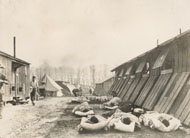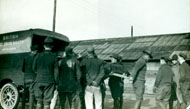In Her Words
Letter from Julia C. Stimson to her family, March 25, 1918
Rev. Henry A. Stimson, father of Base Hospital 21 chief nurse Julia C. Stimson, compiled his daughter’s letters to her family during the First World War into the book, Finding Themselves. Published in 1918 (before the end of the war), Finding Themselves tells of the experiences and gradual changes in the nurses as they “found themselves” through days and nights of unrelenting and difficult service.
The army hospitals in Rouen experienced a sudden rise in admissions resulting from the German offensive in the spring of 1918. In this letter Julia Stimson describes their extraordinary nursing efforts.
March 25, 1918
This typewriter is almost hot, it has been worked so hard to-day. I think Miss Taylor and I have written over forty Dangerously Ill and Seriously Ill letters to-day, from which you may infer that we are busy. We are busier than we have ever been before. I am snatching a few moments while the day and night shifts change to tell you a little about things, then in a little while I must go down to the lines and see how things are and send off to bed the many day nurses I am sure to find on duty still. The nurses all hate so terribly to go off when there are so many things remaining to be done, but I cannot have them working both day and night, for in a few days, if they keep that up, they won’t be able to work at all. No one has had a minute “off duty” for five days now and they are beginning to show it, but they have got to keep this up for a while longer and so I drive them off with many things left undone. Of course there are always night nurses to go on with the work, but they are usually only one to a hut or line, where in the day-time there may have been four or five.
Our excitement began last Thursday the 21st with an order that for all ranks Rouen was to be “Out of Bounds.” This was because they had Smallpox there. We have maids, French teachers, stenographers, and sewing-women coming back and forth every day and things looked complicated – and were. But only for a while. Everybody was vaccinated, and the important civilians were given daily passes, and so our work goes on about as usual. I made temporary arrangements for four maids to stay here on the grounds with us.
That very day we were given an hour’s warning in getting our next team off for a Clearing Station. The people had been designated but they were not packed. You never saw any woman pack in more double-quick time than our dear nurse was. We have been a bit worried about her ever since she left, for disquieting reports of great activity in her vicinity have been coming to us every day since she left. She has six good American men to look after her, which is a comforting thought to us.
That day patients began to pour in upon us. We were told to be prepared to receive unlimited numbers. Well, they have been coming. Day before yesterday we operated on fifty cases, yesterday fifty-one, to-day they had seventy-three scheduled. I have just been down on the lines and to the operating-room. You would not believe me if I told you how that place looks. They have at least forty more cases to operate on to-night. Both the day and the night shifts of nurses are there, but the day shift promises to go up in an hour. As more convoys are due to-night, there may be even more to be operated on than are scheduled. The doctors are about dead. They are working in shifts as much as they can. The stretcher-bearers are dead tired, but as cheerful as monkeys. I was just at the “Point,” where ambulances are loaded and unloaded, and a convoy of stretcher cases was just going out to be shipped to England, I think. Our American boys were jollying the Tommies who were on the stretchers, and it all sounded so cheerful.
It is not so cheerful when the convoys come in. Last night we had a convoy come in that seemed to be all D.I. cases, many were too badly off to be operated on. . . . Major Fischel has just been in to say that since there must be two hundred “walking wounded” ready to go out by ten a.m. he wants to know if I can have nurses to help dress their wounds early in the morning. I said “Yes, if he meant by early, 7:30” because I wanted the nurses to have something to eat before the start. Seven thirty will do, so 200 walkers who came in to-day will have fresh dressings put on their injuries and be ready to be shipped along at ten. . . .
You ought to see the way we are using up supplies. But so far we seem to have enough of the necessities. We have long since ceased to attempt to change sheets between patients. A good many patients have been in beds without sheets at all, but that is a minor matter. Major Fischel just gave me a guess on the number of patients we have taken in or sent out to-day. I said five hundred, and he replied, “nearly double that.” We have taken in and sent out all day long, and to show the spirit of the men, Major F. repeated the remark of the head Sergeant of the records, who said he wished we could get in a few more before midnight so that he could say it had been over a thousand. It is a stupendous piece of work and it all goes so smoothly. Now I must go to bed for I am weary, but first I must see about the nurses for the morning. . . .
Much, much love,
J.
Next letter from Julia Stimson to her family (April 12, 1918)>>
Return to Letters & Memos (In Her Words)
Return to In Her Words
Back to Top


